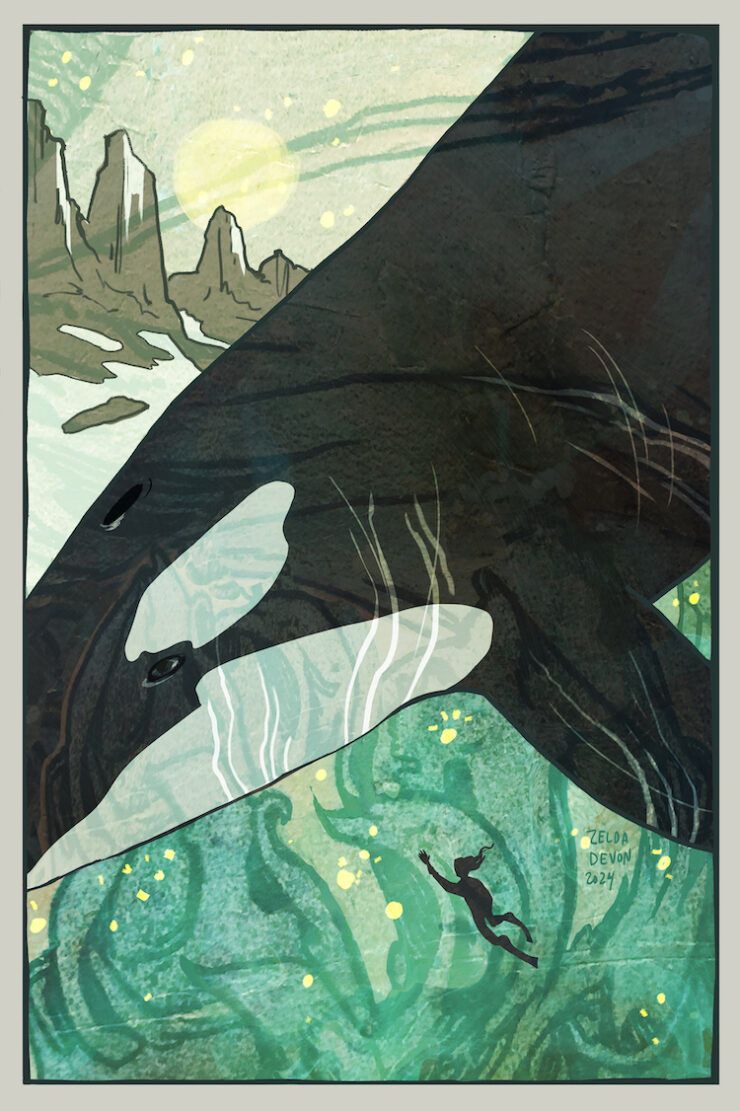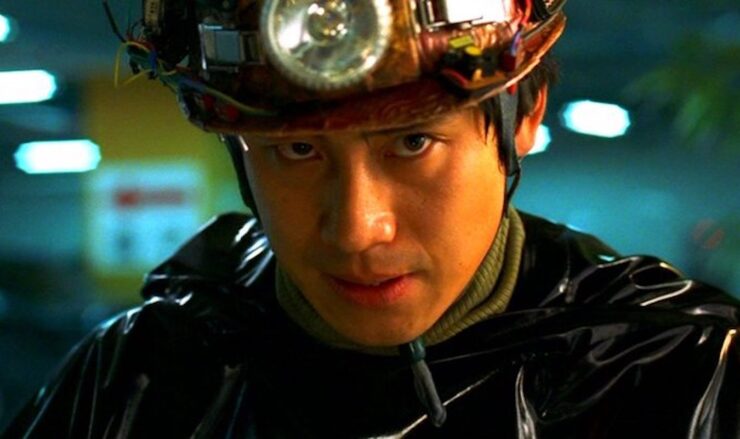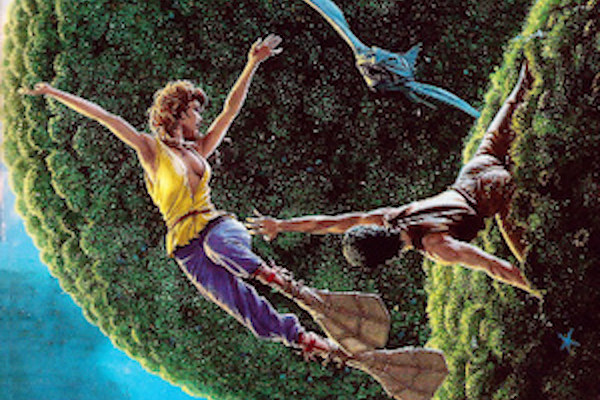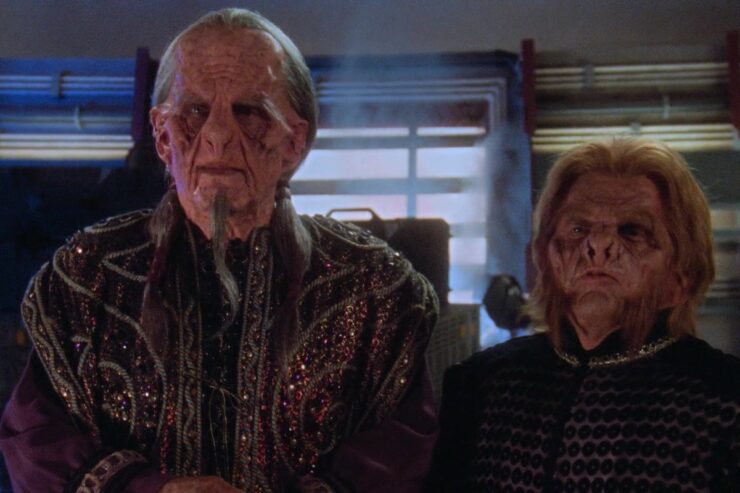Misunderstanding threatens a commune whose survival is dependent on precise communication with another species…
“They don’t want to talk, Vega.”
Vega readjusted the waterproof screen hooked to their sonar. The pod was still circling below, graceful black-and-white behemoths rendered as drifting pixels. The babeltech transmitter was still functional, squealing a standard Patagonian greeting into the dark waves. But just like yesterday, and all the days prior, not a single orca spoke back.
“Come on,” Miguel pleaded. “It’s cold. It’s been hours.” Her younger brother, small and skinny for seventeen, was huddled in the back of the boat, shivering despite his puffy orange coat. “Let’s go home.”
“You were the one who wanted to come along,” Vega said, checking the transmitter settings. “Maybe there’s been a dialectal shift. Maybe they don’t like this pitch anymore.”
“Maybe they already know what we want from them,” Miguel said, face stiff as the wooden masks he’d been carving lately. “And know they don’t want to give it to us. Because they’re nonhuman apex predators who don’t give a shit whether we starve or not.”
The words triggered a familiar dread, the one that had been seeping slowly through Vega’s stomach wall for the past two weeks. She said nothing.
“Could be for the best, now that Mom’s dead,” her brother muttered. “Could be the commune was never built to last without her.”
In all of a split second, Vega’s dread oxidized to burning anger. “Don’t say that,” she snapped. “Don’t ever say that. We’re still here, and once we have the plankton farm running, we’ll be just fine, so don’t you ever talk about—about giving up. It’s fucking cowardly.”
Miguel flinched with his whole body, ears flushing scarlet, and Vega could feel her own face heating up to match.
“I’m sorry,” she said.
“I didn’t say anything about giving up,” Miguel muttered, with a bruised catch in his voice.
“I’m sorry,” Vega repeated, wishing she could reel it all back. “I just—”
The sonar chimed, and her next words caught in her throat as an enormous snout exploded out of the stormy gray water. The spyhopping orca was female, gigantic, her black hide scarred from years of hunting. The matriarch had finally come to open negotiations. Vega glanced at her brother, whose dark eyes were winched wide, then she pulled up the babeltech input with a trembling finger.
“Greetings to the matriarch,” she said. “I am named Vega.” She paused, tried to remember the grammatical guidelines that best let the tech do its work. “The other human is my brother. My brother is named Miguel. We come from the Punta Norte commune.”
The transmitter clicked and squealed. Just under the white slash of the orca’s patch, her glossy brown eye narrowed. Vega tried to avoid anthropomorphization, to read it only as visual focusing and not a signal of suspicion.
“The Punta Norte commune is struggling to feed itself,” she continued. “We seek your permission to begin harvesting plankton here in your waters.”
The matriarch’s jaw slivered open, revealing rows of conical teeth.
“There will be submerged construction,” Vega said. “But only for a brief period. And once it’s complete, your pod will be welcome to—”
“Away.”
The single synthesized word bleated from the receiver. Before Vega could seek clarification, the matriarch plunged back beneath the waves, leaving a whirlpool gurgling in her wake, and before the boat could stop rocking, the entire pod had turned east and swum off.
Vega stared after them in utter despair. Today would end just like yesterday.
“We can talk, if you want,” Miguel said quietly, still looking out across the ocean. “About Mom. We haven’t really done that yet.”
Vega turned to him, feeling a familiar numbness. She knew they should talk, knew it was something her brother needed even if she didn’t. But she was cold and aching and hollowed out by successive failures.
“We will,” she promised. “Just not right now. Let’s get home and get warm first.”
But Vega couldn’t stay within the bounds of the commune for long, not when every person she came across had the same question, in words or a look: Any luck? Any luck today? Even worse than the worried faces were the trusting ones, though the past weeks had eroded that population.
And everywhere she looked, she still saw Mom. Lounging on the stoop of a neighbor’s biobrick house, or elbow-deep in the main solar generator, or squatting to inspect whatever had shown up in the wild, tangled gardens—back before the blight wiped them out.
Mom had been the beating heart of this place and its nervous system at the same time, and Vega didn’t know how to be either. So instead of telling people No luck today, or sitting down to open wounds with Miguel, she slipped away, back to the beach.
She hauled the transmitter with her, ostensibly to recalibrate it, but it was only camouflage. Her real goal was to be alone and miserable by the water. She clambered across sea-slimed rock to her usual perch, a broad stone with a shallow indent. Then she unspooled the receiver and lowered it into the water—carefully, because it was valuable. Sat down right in a cold puddle, because she was not.
When Vega had been younger, she and Miguel and their mom sometimes watched the orcas from this stretch of shore, competing to spot dorsal fins slicing the waves. The pod had seemed beautiful, alien, dangerous. Something to admire from—and keep at—a respectful distance.
That wasn’t an option anymore. There could be no legal plankton farming without the orcas’ say-so, and the company loaning Punta Norte the equipment had given them a hard deadline to produce proof of agreement. Vega shut her eyes and pushed the heels of her hands against them, blacking out the world and all the problems therein, the biggest of them being the fact that the deadline was now less than forty-eight hours away.
“You are named Vega.”
The synthesized voice jolted her eyes open. She stared down at the transmitter in shock, then scrambled for the input. The pod had returned, and now someone was in the shallows, close enough that she could pick up their clicks.
“Yes,” she blurted. “Yes, I am named Vega.”
“I am named Breathe-For-Us,” the voice said. “Circle in place, Vega. I will come to you.”
For a giddy moment, Vega thought she was being ordered to get up and pirouette—and nearly did it, too. But it made sense that the orcas had no term for sitting still on a rock. She re-checked the transmitter settings, then hugged the babeltech to her chest and watched the frothing waves for dorsal fins.
There: gray, lopsided, carving through dark water. It wasn’t the matriarch. This orca had a more angular eyespot, less scarring. Vega felt her hopes dim slightly, but she was unwilling to extinguish them completely as another clicking burst of speech hit the receiver.
“Why are you named Vega?” the babeltech intoned.
Vega blinked. “It’s the name of a star, up in one of the northern constellations,” she said. “My mother named me after that star.”
The orca’s dorsal fin rose skyward like a pointing finger. “We do not know star names,” came the synthesized voice. “They are too far to hear.”
“For us, too,” Vega said. “We invent the names.” She gripped the input more tightly. “And you? Why are you named Breathe-For-Us?”
The orca was close now, swimming perilously near to the rocks. A female, but not quite as old or as massive as the matriarch. “Breathe-For-Us is the name given when a calf fears their first breath of air,” the babeltech bleated. “When the calf fears to breach. My mother sang it to me, and the pod sang with her, and it became my name.”
“That’s amazing,” Vega said, and meant it. “I’m glad you breathed. Glad you survived.” Her heart thrummed hopefully in her chest. “I’m glad you and I can speak now, because the matriarch—”
“Do you know why she ignores you, Vega?” Breathe-For-Us interrupted.
Vega’s face grew hot, and she felt her shoulders slump of their own accord. “No,” she said. “Tell me. Please.”
“You speak to us as if we were salmon-gluttons,” the orca said. “We are unamused.”
Vega knew the pejorative referred to the resident pods up near Old Vancouver, for whom the Patagonian orcas held little love. But she also knew that her babeltech was tuned specifically, painstakingly, to the local dialect, and was about to defend herself when Breathe-For-Us asked a second question.
“Do you know our way-of-hunt?”
Vega bit at the inside of her cheek. Orca hunting methods were almost as varied as human ones, but there was a particular behavior found only here. “Stranding,” she guessed, as the orca drifted ever closer. “You mean stranding.”
In answer, her conversation partner burst free from the water. Spray drenched Vega’s clothes, stung her eyes; she stumbled blindly to her feet with a shout of alarm, still clutching the babeltech to her chest. She heard a sickly sound, meat and blubber smacking jagged stone, as the orca hurled herself out of the shallows and onto the rocks.
“Holy shit,” Vega said, not caring if the babeltech could interpret the curse. “Holy shit, are you all right?”
Breathe-For-Us wriggled on the shoreline, transformed in all of an instant from graceful titan to oversized larva. She bared her bright teeth, and this time Vega could hear both the chittering squeal and the babeltech’s interpretation.
“I come to your world shucked,” the orca said. “You come to ours in a shell, refusing its smallest touch.”
Vega stared, tracing the vast web of scars crisscrossing her hide, picturing for the first time the hundreds of strandings that had created them. Then the tide surged back, and with a perfectly timed thrust of her tail, Breathe-For-Us rolled herself from rock to water. She drifted there in the shallows for a moment, belly scraping stone, the whole of her body heaving from the effort.
“We are unamused,” she repeated, and swam away.
Vega returned to the commune at a shambling run, desperate to share her news, equally desperate to not slip and fall and smash the precious babeltech to pieces. She’d seen stranding before, if never up close. So had Mom, so had Miguel, so had any other Punta Norte inhabitants who took time to orca-watch. It was the hunting technique the Patagonians were famous for, one of the earliest proofs of nonhuman cultural transmission.
In order to prey on sunbathing seals, local orcas left the safety of the water entirely. They would throw their bodies onto the rocky shoreline, snag a fur seal in their jaws, then combine precise timing with brute strength to return to the waves before their bulk made the stranding a permanent one. Older orcas could be seen teaching the method to younger ones, practicing on chunks of driftwood, knots of seaweed.
But it was more than just a way-of-hunt. Vega saw that now, and the instant she saw her younger brother, slumped on the steps of their biobrick hut with his carving knife in hand, she knew what she needed to do.
“One talked,” she blurted. “While I was at the beach, an orca came to talk, came right up to me, and told me why the pod’s ignoring us.”
Miguel snapped to attention, dark eyes blinking hard. “And?”
“Because they think they’re real tough customers,” Vega said. “And they only talk to other tough customers. You know stranding?” She freed one hand and made it into an orca, thrashed it onto an imaginary shoreline. “Breathe-For-Us—that’s the one who came to talk—she did it right in front of me. Said she comes to our world naked.”
“They’re always naked,” Miguel said, frowning. “Why do they even have a concept for naked?”
“The translation was ‘shucked,’” Vega said, hefting the equipment in her arms. “But it’s not important. What’s important is that I do the same thing, but in reverse.” She envisioned it properly for the first time, and couldn’t quite suppress her shudder. “I have to get in the water with them. No shell. Meaning: no boat.”
Miguel’s eyes widened. “Vega. No.”
“People used to do it,” Vega said. “They used to do it all the time.”
“That was before the orcas enacted their . . .” Miguel waved his arm, coaxing the term from memory. “Retaliation Doctrine,” he finished. “Before they started ramming boats and dismembering kayakers.”
“And the Retaliation Doctrine was pre-babeltech,” Vega argued. “It was their only way of telling us to stop fucking with them. It’s been years now since a fatal incident.”
She regretted her choice of words the millisecond they left her lips. Fatal incident was only syllables off fatal infection. Her brother’s face spasmed, unable to hide the pain. He glared at the babeltech bundled in her arms, and Vega could see all his grief and frustration rising, ready to breach.
But when he spoke, his voice was calm. “You won’t be able to haul all that stuff around underwater.”
Vega felt a rush of relief. “No,” she agreed. “Think you can help me streamline it?” She paused. “We could strap it to Mom’s old diving gear.”
The corners of Miguel’s mouth lifted just slightly, taking the liminal space between smile and grimace. “A babelmask,” he said.
Vega nodded.
Every person in the commune gathered to send them off the next morning, murmuring encouragements, squeezing Vega’s shoulders. The hope had returned to their faces, and it was more frightening than ever. Vega did her best to murmur thanks back. To smile warmly. To look brave, and capable, and more like her mother.
She and Miguel shoved off into the water, angled toward the pod’s feeding grounds—for all their salmon-glutton disdain, when no seals were around the Patagonians ate plenty of fish themselves. Vega breathed deep, inhaling the briny breeze.
“Last chance,” Miguel said, because he was always verbalizing the things she didn’t want verbalized.
“Yeah,” she said.
Her brother looked out over the water, his thumb tapping the tiller. “I don’t think it’s about being a tough customer.”
She blinked. “What?”
“What you said yesterday. The stranding behavior. I don’t think it’s about being tough.” He gave a strained smile, and Vega saw a worrying wetness in his eyes. “I mean, imagine how it must feel for them.”
Vega pictured the scar tissue wrapped around Breathe-For-Us’s body. “It would hurt,” she said, running her fingers absently along her wetsuit. “A lot.”
Miguel nodded. “Physically? Big time. Mentally, even worse.” His thumb tapped quicker on the tiller. “I kept thinking about it last night. How it would feel to go from the sea—where you’re the queen, where you’re the apex predator, where even great white sharks run away from you—to bellied down on the rocks. Totally exposed, heavy all at once. Gouging yourself open on edges you can’t even see.”
Vega’s brain churned through the image, then past it, to what was coming next: her floundering in the dark water with predatory behemoths circling around her, beneath her. “Helpless,” she said, windpipe squeezing tight around the word. “They feel helpless.”
“They feel vulnerable,” Miguel said sharply. “It’s not the same thing, Vega. Because they know there’s a way to get out of it, and they know . . .” He drew a shuddery breath. “They know it’s worth doing. They share big kills, right? So for the good of the pod, that little moment of absolute terror is worth it. Feeling vulnerable is worth it.”
A small, cruel voice in the back of Vega’s mind, the one she heard so often lately, wanted to ask her brother if he was done playing psychologist. Wanted to suggest they get back to focusing on the situation at hand, on the actual stakes. Instead, she reached inside herself for that particular transmitter and ripped it out by the wires.
“The first time Mom got sick, back when we were kids,” Vega began. “I thought I would be able to handle her dying.” Saying it aloud made Vega queasy with shame, made Miguel flinch, but she pushed on. “I wrote up a list of all the things she did for us. All the responsibilities. And I thought—okay. I’ll be able to do those things. Or else learn them. I wanted . . .” She swallowed back the mudslide building in her throat. “I wanted to take care of you so good you’d barely notice she was gone,” she croaked. “But she got better. We got older.” Vega looked her brother in the eye. “Now all of a sudden she does die, and I realize I have no fucking clue.”
Miguel stared for a moment. Then he fell against her, letting go of the tiller to wrap both scrawny arms around her, and she hugged back hard enough to bruise. All the spaces she’d thought were hollow were brimming over now; all the numbness was boiling away. She suspected it would be back, suspected she still needed it in some way, but for now she stroked her brother’s head and sobbed herself dry.
They stayed sitting like that until their sonar chimed. Tear-blurred shapes were moving on the waterproof screen, the pod gathering. Still holding Miguel, Vega craned over the side of the boat. Massive silhouettes slid back and forth beneath the dark water. She knew one of them had to be Breathe-For-Us, waiting to see if fearful humans could learn new tricks.
Her brother gave her a final squeeze, then opened his bag and pulled out the babelmask, the thing he’d spent half the night sculpting and soldering. The receiver now looped into a pair of waterproofed earbuds; the stripped-down transmitter sat across the front of the oxygen intake like a toothy grin. There was a tiny star etched into the bridge of the goggles.
“Like it?” Miguel asked.
“It’s beautiful,” Vega said, and realized it also looked kind of alien, kind of dangerous, which meant it was perfect for the job at hand.
“Thanks.” Miguel paused. “Whether this works or not, whether the commune stays or breaks up—she’d be glad you tried. And she’d want you and me to be happy anyway.”
Vega inhaled. Nodded. Then she slipped the babelmask over her head and let Miguel fasten it to the neck of her wetsuit. Fear was rising from the pit of her stomach in slow, trembly bubbles; walking to the edge of the boat felt like walking to the edge of a cliff. Memories of watching the pod hunt came to her unbidden: the sudden strike, the billowing red cloud, the moment a thrashing animal became drifting meat. It made her heart thump harder.
Maybe what she’d taken for advice had been meant as a final dismissal, a veiled threat. Maybe Breathe-For-Us was still young enough for cruel games, luring a particularly annoying human into the water to be tossed from maw to maw like a rag doll and finally drowned.
“Wish me luck,” Vega said, the words accompanied in stereo by a click and squeal.
“Good luck,” Miguel said quietly. “Love you, Vega.”
“Love you, Miguel,” she replied, and stepped off the boat.
Even through the wetsuit, the icy water hit her bones. When it closed over her head and she took her first pull of oxygen, she pictured an orca calf breaching the surface for the very first time. Then the swirling vortex of bubbles dispersed, and she saw that once-calf gliding toward her. Breathe-For-Us seemed even bigger down here, dorsal fin rising like a crooked tower.
Her skin was practically smooth compared to the scarred and pitted hide of the orca swimming behind her. The matriarch was back, and for the first time, Vega noticed her dorsal had a certain lopsidedness to it, as well. Breathe-For-Us let out a long, popping burst, and the babelmask turned it to synthesized speech in Vega’s earbuds.
“Welcome, Vega,” the orca said. “My mother has agreed to speak with you. If you are ready to speak.”
“I’m ready,” Vega said, and the words became a fluid whistle, high and true.
“Breathing Constellations” copyright © 2024 by Rich Larson
Art copyright © 2024 by Zelda Devon
Buy the Book
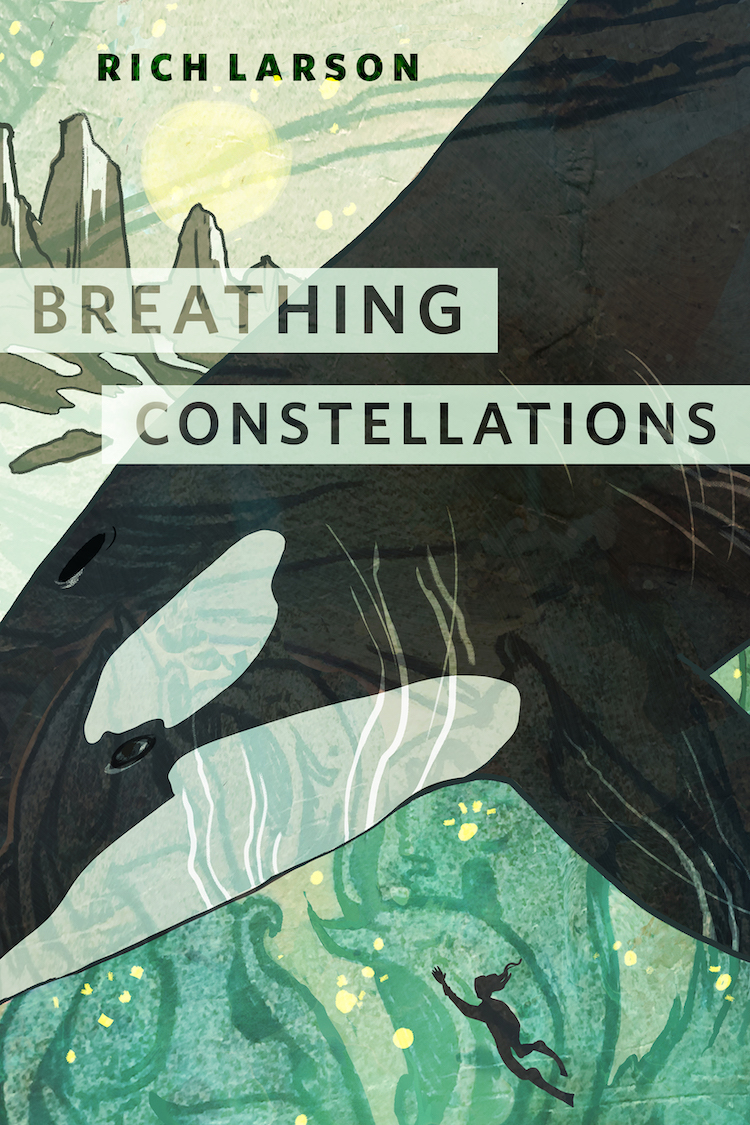

Breathing Constellations










